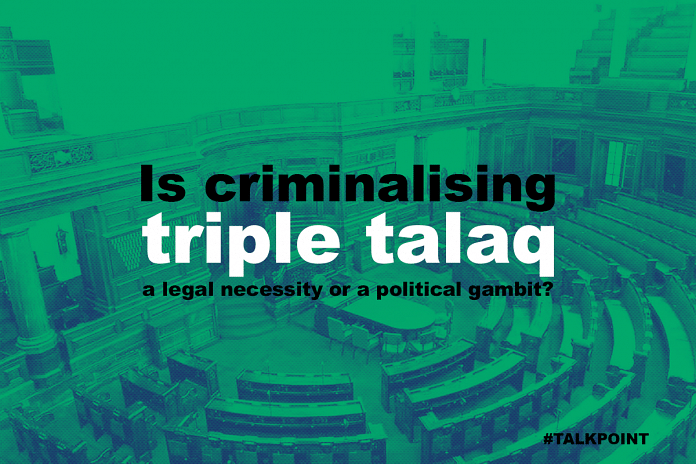
ThePrint asks:
Is criminalising triple talaq a legal necessity or a political gambit?
An abolition of the practice of triple talaq was first called for in 2011. Irrespective of who is in power, it is the constitutional duty of Parliament to help grant legal security to its citizens.
The concern at the heart of this issue is that Muslim women must be given legal protection in matters of personal law. Women are constitutionally entitled to it, and it is the constitutional imperative of elected representatives.
Our constitution allows for personal laws based on religion. That is why we have the Hindu code bills and the Christian Marriage Act. They act as safeguards of gender justice in terms of family, marriage and succession.
At the same time, there has been legal discrimination against Muslim women in India. They are a community governed by the 1937 Shariat Act, which has never been reformed.
The Act is silent on important aspects like divorce, polygamy, age of marriage, and property rights given by the Quran. This law is of no use to Muslim women. Thus, there is a vacuum when it comes to legal aid for Muslim women.
Here are other sharp perspectives on the question:
Faizan Mustafa, vice-chancellor of NALSAR University of Law, Hyderabad
Hilal Ahmed, associate professor at CSDS
Salman Khurshid, politician and advocate
Deterrence is fundamental to law. Without punishment, laws are meaningless. Despite the Supreme Court judgment, instances of Triple Talaq are still coming to light. This happens because there is no fear of consequences.
According to the India Penal Code, bigamy is punishable by up to seven years in jail. Similar provisions exist for dowry and domestic violence. Then why not for triple talaq? It is equally oppressive. The wife must have the right to complain about an erring husband.
Bringing about a law is necessary. The Bill can benefit from a few changes. It could incorporate a divorce procedure involving reconciliation and mediation. Perhaps it could call for a minimum 90-day period before a divorce, a period where the couple can attempt to fix their problems through reconciliation and mediation. This procedure is valid according to the Quran too.
Another thing is that if a divorce does take place, then the woman should have a home, maintenance, and custody and support for her children.
This Bill will help pave the way for further reforms, like in the matter of halala, polygamy, and property. These are areas where legal intervention is necessary.
Zakia Soman is a women’s rights activist and a founding member of Bharatiya Muslim Mahila Andolan.

If we are to go by what the Supreme Court has observed in its judgment, which also happens to be the best resort amongst all, uttering ‘talaq, talaq,talaq’ has no effect on the marital ties of the Muslim couple; the utmost sanctity of such marriage remains completely unperturbed by such utterance devoid of any prowess. So, how can you, or for that matter anyone with his grey cells intact and functioning, criminalize such an act of utterance, or even, LEGISLATE upon it? And how would the question of maintaining the wife even arise if there’s factually no divorce taking place by such ineffective utterance? Cruelty met out to the wife might as well be dealt u/s 125 CrPC , all Muslim women have recourse to it after the judgment in the Noor Sabah Khatoon case. What are you actually looking to criminalize, since now, the husband shouting talaq thrice without gasping for a breath has no effect? The intent to divorce his wife?? If so, criminalize such intent , if resorted to, by men belonging to other religious sects (read: All hail, Art 14!)!
But if triple talaq is invalid, why is it being practiced and after pronouncing it why is wife is treated as divorced? There would not be any need for punishment if, after supreme court’s announcement, it had not been practiced. This means just saying it invalid, it will not stop. Moslem society should say it categorically that by adhering to courts opinion, we will consider it invalid and women will not be considered as divorced even if it is pronounced.
She makes zero sense. How can you criminalise a non-offence? It’s absolutely bonkers. The Supreme Court has said that Triple Talaq is invalid. So if a man says Talaq three times to his wife, he does ****not**** divorce her. If he goes on to marry another woman, sure, he breaks the bigamy laws. Where is the deterrence? Is uttering some words now (which have no legal consequence) punishable by jail? Common sense anyone?